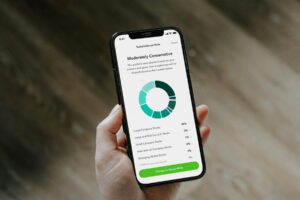
Roshan Ramlal, FACS Agent, UGA Extension Forsyth County
As we enter graduation season, thousands of recent grads will enter the workforce. High school students from the eight high schools throughout Forsyth County and college graduates, both local and out-of-state, will collect their very first paycheck through summer jobs, paid internships or full-time employment. College graduates will be eager to find the fastest track to building wealth, having financial security and achieving financial independence.
Financial literacy provides new income earners with fundamental knowledge to be able to manage their money and spend wisely. It is important to begin to understand and practice good financial habits with that first paycheck.

Cost of Living in Forsyth County
Cost of living in Forsyth County is 21.9 higher than the national average and 29% higher than the average in Georgia. For a single person, it is 3.5% less expensive than the national average ($4,600/month) for total of $55,200 for the year to live in this county. Financial literacy, tips and tools will help Forsyth County residents thrive by enabling them to make better, informed decisions about their future on how to live, work, travel, and have fun without breaking the bank and going into unnecessary debt.

Save, Save, Save
Saving is a habit, a financial muscle we should use daily. It is not too late to set reasonable goals for 2025 savings. Remember to save first, not last. As soon as you get paid or receive cash as a graduation gift, birthday, or allowance, put it into your savings bucket. Track your spending and your savings. It is a well-known fact that people who track their spending early, find they spend less and save more. Look for deals. When you do spend money, shop around for the best price. Don’t get caught up in the brand names at the stores- find the price tags. Ask questions. Use ChatGPT as a tool to do your research, get questions answered and find local trusted resources. Reach out to local certified financial planners and advisors.
No More Ramen: Your Guide to Smart Spending
Now is the time to understand the basics of personal finances. To get started, track your spending using apps like Mint, YNAB, or even just a simple spreadsheet.
- App It Up: Apps make tracking easy! Link your accounts and see where your cash is going.
- Split It Up: Categorize expenses: rent/utilities, food (beyond takeout!), transportation, fun, and savings. When shopping at big-box stores or supermarkets, University of Georgia professor Dr. John Grable recommends separating grocery items from personal care products and cleaning products to get a better idea of where your money is going.
- Real Talk: Be honest about your spending. Log all your expenses on your phone or write it down. Take photos of receipts. Transfer expenses to an app or spreadsheet. Those coffee runs add up!
- Flex Your Budget: Life happens. Build in some wiggle room for unexpected costs or that spontaneous concert. Dr. Diann Moorman from UGA’s Housing and Consumer Economics Department suggests the 50/20/30 plan. Use free online tools to get you started, like Nerdwallet.
- Local Lowdown: Factor in local costs like rent, gas, and those weekend hangout spots.
Securing Your Future: Smart Saving Strategies (Adulting 101)

Building an emergency fund is your financial safety net. Start thinking about your goals: that dream apartment, a car, international travel, or even early retirement.
- Emergency Fund: Your Backup Plan: Aim for 3-6 months of living expenses. Think of it as your “adulting” fund.
- Goal Setting: Dream Big, Save Smart: Set specific, realistic goals. Want to move out of your parents’ basement? Into Atlanta? Need a new car? Calculate the cost and break it down into monthly savings.
- High-Yield Hustle: Look into high-yield savings accounts or CDs for better returns. Visit your local bank or credit union for personalized service. Every little bit counts!
- Investing 101: Start small with investing. Apps like Robinhood or Acorns make it easy. Do your research, or ask a professional.
- Local Banks FTW: Local credit unions often have better rates and personalized service.
Your Financial Shield: Navigating Debt & Protecting Finances (Don’t Get Scammed!)
Credit cards and loans can be useful, but they can also be traps. In these unpredictable markets and trade wars affecting global markets, being in the know and in control of your money is essential. Talk to financial professionals. Protect yourself from being scammed. For trusted sources, contact your Forsyth County UGA Extension office.
- Debt Smackdown: Prioritize paying off high-interest debt. Use the debt avalanche or snowball method.
- Credit Score Check: Monitor your credit score. It impacts everything from loans to apartments. Use apps like WalletHub for free credit score checks.
- Scam Alert: Be wary of phishing emails and online scams. Never share your personal info with untrusted sources.
- Identity Theft: Stay Vigilant: Regularly check your credit reports and report any suspicious activity.
- Local Resources: Your Allies: Know where to report fraud in your area.
Your Community Support Network: Local Resources
Your community has resources to help you succeed. The UGA Cooperative Extension offers valuable support.
- UGA Extension: Your Financial Mentors: Free workshops on budgeting, credit, and more are available. Reach out to your FACS Agent for more information.
- Library Love: Your local library has books, online resources, and sometimes even workshops.
- Local Bank Pros: Local banks and credit unions can provide personalized advice.
- Community Collabs in Spanish: Look for assistance from local organizations.
- Online Deep Dive: Use ChatGPT to find resources and answer questions from wherever you are, whenever you want.
5. Your Path to Success: Conclusion (Your Financial Glow-Up)
You’ve got this! Building good financial habits now will pay off big time. Take action, explore your resources, and share your tips with friends. Let’s build a stronger financial future together!